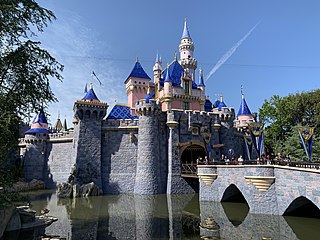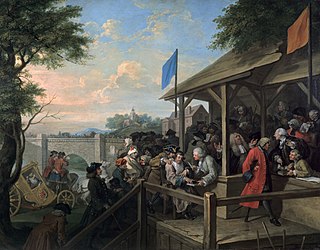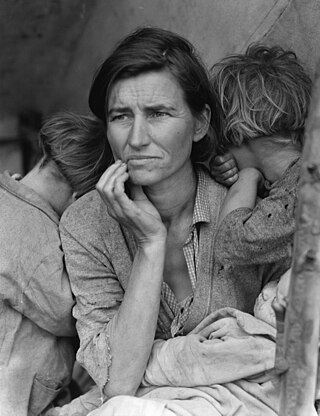
California is a state in the Western United States, lying on the American Pacific Coast. It borders Oregon to the north, Nevada and Arizona to the east, and an international border with the Mexican state of Baja California to the south. With 39 million residents across an area of 163,696 square miles (423,970 km2), it is the most populous U.S. state, the third-largest by area, and most populated subnational entity in North America. The Greater Los Angeles and San Francisco Bay areas are the nation's second- and fifth-most populous urban regions, with 19 million and 10 million residents respectively. Los Angeles is the state's most populous city and the nation's second-most, after New York. California's capital, Sacramento, is located in the Central Valley.

Orange County is a county located in the Los Angeles metropolitan area in Southern California, United States. As of the 2020 census, the population was 3,186,989, making it the third-most-populous county in California, the sixth-most-populous in the United States, and more populous than 19 American states and Washington, D.C. Although largely suburban, it is the second-most-densely-populated county in the state behind San Francisco County. The county's three most-populous cities are Anaheim, Santa Ana, and Irvine, each of which has a population exceeding 300,000. Santa Ana is also the county seat. Six cities in Orange County are on the Pacific coast: Seal Beach, Huntington Beach, Newport Beach, Laguna Beach, Dana Point, and San Clemente.

Santa Ana is a city in and the county seat of Orange County, California, United States. Located in the Greater Los Angeles region of Southern California, the city's population was 310,227 at the 2020 census, making Santa Ana the second most populous city in Orange County, the 13th-most populous city in California, and the 65th densest large city in the United States. Santa Ana is a major regional economic and cultural hub for the Orange Coast.

Loretta Lorna Sanchez is an American politician who served in the United States House of Representatives from 1997 to 2017, representing parts of central Orange County, California. A member of the Democratic Party, she was first elected in 1996, when she defeated long-serving Republican U.S. Representative Bob Dornan by fewer than 1,000 votes. During her time in the House of Representatives, Sanchez was a member of the Blue Dog Coalition of moderate-to-conservative Democrats.

Anaheim is a city in northern Orange County, California, United States, part of the Greater Los Angeles area. As of the 2020 census, the city had a population of 346,824, making it the most populous city in Orange County, the tenth-most populous city in California, and the 55th-most populous city in the United States. The second most populous city in Orange County in terms of land area, Anaheim is known for being the home of the Disneyland Resort, the Anaheim Convention Center, and two professional sports teams: the Los Angeles Angels of Major League Baseball (MLB) and the Anaheim Ducks of the National Hockey League (NHL). It also served as the home of the Los Angeles Rams of the National Football League (NFL) from 1980 through 1994.

Rowland Heights is an unincorporated area in and below the Puente Hills in the San Gabriel Valley, in Los Angeles County, California, United States. The population was 48,231 at the 2020 census. Rowland Heights is in the Los Angeles metropolitan area and represented by the County of Los Angeles and is the largest census designated place in Los Angeles County by area and the county's fourth largest CDP by population. The area has a high Taiwanese population and was known as “Little Taipei” in the 1980s and 1990s, when it saw an influx of wealthy immigrants from Taiwan.

Political colours are colours used to represent a political ideology, movement or party, either officially or unofficially. They represent the intersection of colour symbolism and political symbolism. Politicians making public appearances will often identify themselves by wearing rosettes, flowers, ties or ribbons in the colour of their political party. Parties in different countries with similar ideologies sometimes use similar colours. As an example the colour red symbolises left-wing ideologies in many countries, while the colour blue is often used for conservatism, the colour yellow is most commonly associated with liberalism and right-libertarianism, and Green politics is named after the ideology's political colour. The political associations of a given colour vary from country to country, and there are exceptions to the general trends, for example red has historically been associated with Christianity, but over time gained association with leftist politics, while the United States differs from other countries in that conservatism is associated with red and liberalism with blue. Mass media has driven a standardisation of colour by political party, to simplify messaging, while historically the colour a candidate chose to identify with could have been chosen based on other factors such as family or regional variations.

An Okie is a person identified with the state of Oklahoma, or their descendants. This connection may be residential, historical or cultural. For most Okies, several of these connections exist and are collectively the source of their being Oklahoman. While not an official demographic used or recognized by the United States Census Bureau, Okies, due to various factors, have developed their own distinct culture within larger social groupings both akin to and separate from Midwestern and Southern influences. Included are their own dialect, music, and Indigenous-derived folklore.
Globalism has multiple meanings. In political science, it is used to describe "attempts to understand all of the interconnections of the modern world—and to highlight patterns that underlie them". While primarily associated with world-systems, it can be used to describe other global trends. The concept of globalism is also classically used to focus on ideologies of globalization instead of its processes ; in this sense, "globalism" is to globalization what "nationalism" is to nationality.
Social liberalism is a political philosophy and variety of liberalism that endorses social justice, social services, a mixed economy, and the expansion of civil and political rights, as opposed to classical liberalism which favors protection of property rights, freer markets, limited government, and an overall more laissez-faire style of governance. While both are committed to personal freedoms, social liberalism places greater emphasis on the role of government in addressing social inequalities and ensuring public welfare.
In general, liberalism in Europe is a political movement that supports a broad tradition of individual liberties and constitutionally-limited and democratically accountable government. These European derivatives of classical liberalism are found in centrist movements and parties as well as some parties on the centre-left and the centre-right.

William H. Press is an American talk radio host, podcaster, liberal pundit and author. He was chairman of the California Democratic Party from 1993 to 1996, and is a senior political contributor on CNN. He hosts The Bill Press Pod podcast, and his weekly column is syndicated by Tribune Content Agency.
In modern politics, "law and order" is an ideological approach focusing on harsher enforcement and penalties as ways to reduce crime. Penalties for perpetrators of disorder may include longer terms of imprisonment, mandatory sentencing, three-strikes laws and even capital punishment in some countries. Supporters of "law and order" argue that harsh punishment is the most effective means of crime prevention. Opponents argue that a system of harsh criminal punishment is ultimately ineffective because it self-perpetuates crime and does not address underlying or systemic causes of crime. They furthermore credit it with facilitating greater militarisation of police and contributing to mass incarceration in the United States.

The Freeway Series is a Major League Baseball (MLB) interleague rivalry played between the Los Angeles Angels and the Los Angeles Dodgers. The Angels are members of the American League (AL) West division, and the Dodgers are members of the National League (NL) West division. The series takes its name from the massive freeway system in the greater Los Angeles metropolitan area, the home of both teams; one could travel from one team's stadium to the other simply by driving along the Santa Ana Freeway. The term is akin to Subway Series which refers to meetings between New York City baseball teams The Yankees and The Mets. The term "Freeway Series" also inspired the official name of the region's NHL rivalry between the Los Angeles Kings and the Anaheim Ducks: the Freeway Face-Off.

The Spanish expression la Raza has historically been used to refer to the mixed-race populations, considered as an ethnic or racial unit historically deriving from the Spanish Empire, and the process of racial intermixing during the Spanish colonization of the Americas with the indigenous populations of the Americas.
Modern liberalism in the United States is based on the combined ideas of civil liberty and equality with support for social justice. It is one of two major political ideologies of the United States, with the other being conservatism. Economically, modern liberalism supports government regulation on private industry, opposes corporate monopolies, and supports labor rights. Its fiscal policy opposes any reduction in spending on the social safety net, while simultaneously promoting income-proportional tax reform policies to reduce deficits. It calls for active government involvement in other social and economic matters such as: reducing economic inequality, increasing diversity, expanding access to education and healthcare, regulating economic activity, and environmentalism. Modern liberalism is a large and mainstream ideology in the Democratic Party and nation. Modern liberalism was formed in the 20th century in response to the Great Depression. Major examples of modern liberal policy programs include the New Deal, the Fair Deal, the New Frontier, the Great Society, the Affordable Care Act and the Inflation Reduction Act.

Scott Randall Baugh is an American attorney and politician. He is a member of the Republican Party. He served in the California State Assembly and served as the chair of the Republican Party in Orange County, California from the early 2000's to 2015.

Barrioization is a theory developed by Chicano scholars Albert Camarillo and Richard Griswold del Castillo to explain the historical formation and maintenance of ethnically segregated neighborhoods of Chicanos and Latinos in the United States. The term was first coined by Camarillo in his book Chicanos in a Changing Society (1979). The process was explained in the context of Los Angeles by Griswold del Castillo in The Los Angeles Barrio, 1850-1890: A Social History (1979). Camarillo defined the term as "the formation of residentially and segregated Chicano barrios or neighbourhoods." The term is used in the field of Human Geography.
Pattern and Decoration was a United States art movement from the mid-1970s to the early 1980s. The movement has sometimes been referred to as "P&D" or as The New Decorativeness. The movement was championed by the gallery owner Holly Solomon. The movement was the subject of a retrospective exhibition at the Hudson River Museum in 2008.

The 2024 United States Senate elections in California will be held on November 5, 2024, to elect a member of the United States Senate to represent the state of California. There will be two ballot items for the same Class 1 seat: a special election to fill the seat for the final weeks of the 118th United States Congress, and a general election for a full term that starts on January 3, 2025, starting in the 119th United States Congress. California uses a nonpartisan blanket primary, in which all candidates regardless of party affiliation appear on the same primary ballot and the two highest-placing candidates advance to the general election; however, special election winners can win outright if they win more than 50% of the vote in the first round.















